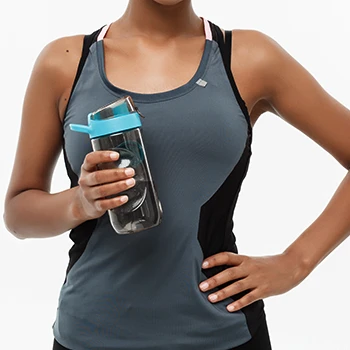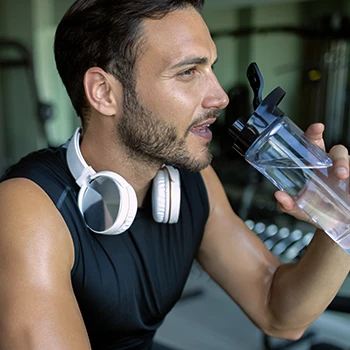I remember my college performance coach always drilling the importance of hydration during training, and as a personal fitness trainer, I now do the same for my clients.
One question I often get from clients and readers is whether some pre-workout supplements are causing them increased dehydration during workouts.
To look at this from a scientific point of view, I teamed up with my nutritionist to review the labels of the pre-workouts that we recommend.
And we found some surprising facts that I can share with you.
Quick Summary
- Pre-workout supplements can potentially dehydrate you during workouts, especially those containing caffeine, which has diuretic effects.
- Pre-workout supplements can cause increased urination and sweating due to caffeine.
- Katherine Zeratsky of MayoClinic.org notes that caffeine-containing beverages generally don't cause fluid loss exceeding the volume ingested when part of a normal diet.
- In my experience, careful selection of pre-workout supplements and consistent hydration are crucial for maintaining proper hydration and maximizing workout performance.
Do Pre-Workouts Cause Dehydration?

From what I've observed with my clients, dehydration can indeed be a side effect of pre-workouts. It's a common issue that many also encounter in their daily lives, not just during workouts.
The one ingredient that has some impact on your hydration levels is caffeine.
Based on the study published in BioMed Central (BMC), because it's such an effective ingredient for improving your performance levels, it's often included in men's pre-workout supplements [1].
The National Center for Biotechnology Information's study states that caffeine also acts as a diuretic, which means that it causes your kidneys to become more active and filter out more water from the body [2].
Over the years, many people interpreted this as being a sign that coffee would cause dehydration. According to insights from the National Center for Biotechnology Information's research, you need to keep in mind that it mainly causes the release of water from your stomach and not from other parts of the body [3].
In my experience, what this means is that while you may need to pee more after taking caffeine in a pre-workout, it won't dehydrate your muscles or other organs.
Dehydration can be reduced and exercise performance can be improved by drinking enough water throughout the day and taking pre-workout supplements.
And you could also consider taking a caffeine-free pre-workout to avoid the effect.
Related Article: Pre-Workout vs Coffee
"Drinking caffeine-containing beverages as part of a normal lifestyle doesn't cause fluid loss in excess of the volume ingested."
- Katherine Zeratsky, R.D., L.D. MayoClinic.org
What Other Factors Influence Hydration?
In my training sessions, I've noticed that using a pre-workout definitely lets me and my clients push harder, leading to increased sweating.
And if the temperature at the gym is higher than standard room temperature, then you'll also sweat more.
Per a study published in the National Center for Biotechnology Information, you have to factor in that caffeine is a thermogenic pre-workout, which means that it will slightly raise your body temperature [4].
Tips For Avoiding It

First of all, take the pre-workout with about 8-10 ounces of water half an hour before you hit the gym.
This should help provide some hydration, and it's something you should do when you train without supplements too.
Then, take regular sips of water during training to rehydrate while you're sweating. I generally aim for about a pint of water in a training session.
And finally, if you want to be precise, then weigh yourself before and after training.
I've personally tested this with my clients: the difference in weight before and after a session is mostly water loss from sweating. I recommend drinking at least that amount post-exercise for optimal rehydration.
FAQs
Do Some Pre-Workouts Make You Retain Water?
Yes, some pre-workouts that contain creatine can make you retain water. Creatine has been shown to make your muscles hold more water. It's a temporary effect but is something to consider when taking it on a regular basis.
How Much Water Should You Drink With Pre-Workouts?
You should drink at least eight ounces of water with pre-workouts. This will help boost your hydration levels before you hit the gym. It will also limit how much water you lose from peeing before you start your workout.
References:
- https://jissn.biomedcentral.com/articles/10.1186/s12970-020-00383-4
- https://pubmed.ncbi.nlm.nih.gov/21346827/
- https://pubmed.ncbi.nlm.nih.gov/24416202/
- https://pubmed.ncbi.nlm.nih.gov/2912010/
About The Author
You May Also Like






